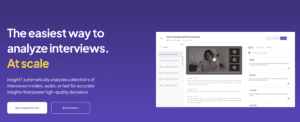Best AI Templates and Techniques for Qualitative Analysis in Market Research
-
Odun Odubanjo
- 10 min read


In the ever-evolving landscape of market research, qualitative data has become a treasure trove of invaluable insights. From consumer interviews and focus groups to expert opinions and industry trends, qualitative analysis provides a deep understanding of the nuances that drive decision-making. However, the traditional methods of qualitative analysis can be time-consuming, prone to human bias, and challenging to scale. This is where Artificial Intelligence (AI) templates and techniques are emerging as game-changers, revolutionizing the way market researchers approach qualitative data.
The Power of AI-Driven Transcription and Summarization
One of the most significant bottlenecks in qualitative analysis has been the painstaking process of transcribing audio and video recordings. Manual transcription is not only time-consuming but also susceptible to human error, potentially leading to missed insights or inaccurate data. AI-powered transcription solutions have emerged as a transformative solution, offering lightning-fast and highly accurate transcripts.
Furthermore, AI-driven summarization tools can condense lengthy transcripts into concise summaries, highlighting the most salient points and themes. This not only saves researchers countless hours but also enhances their ability to quickly grasp the essence of the qualitative data, enabling faster decision-making.
Get a glimpse of Insight7 in action: Watch one of our 1-minute demo below.
Get Started for free
Template-Driven Analysis with Customizable Tags
Template-driven analysis frameworks powered by AI have become indispensable for qualitative market research. These tools enable researchers to define specific topics, themes, or areas of interest upfront, streamlining the analysis process. By creating customizable tags or categories aligned with their research objectives, analysts can rapidly identify and organize relevant insights from interviews, focus groups, or expert opinions.
For instance, a market researcher conducting consumer interviews for a new product launch could create tags such as “product features,” “pricing preferences,” and “competitive landscape.” The AI-powered solution would then automatically categorize and highlight relevant excerpts from the transcripts under these predefined tags, saving valuable time and effort.
Consistent and Unbiased Insights with AI-Powered Coding
Human analysts are susceptible to cognitive biases and inconsistencies when coding and analyzing qualitative data manually. AI-powered coding solutions leverage machine learning algorithms to identify patterns and themes consistently across large datasets, ensuring unbiased and reliable insights.
These AI-assisted coding techniques can detect nuances in language, sentiment, and context that may be overlooked by human analysts, leading to a deeper understanding of consumer sentiments, expert opinions, and market trends. Additionally, AI-powered coding can analyze qualitative data at an unprecedented scale, enabling researchers to uncover insights from vast datasets that would be virtually impossible to process manually.
Seamless Collaboration and Knowledge Sharing
Collaboration and knowledge sharing are critical components of effective qualitative market research, particularly when working with geographically dispersed teams or multiple stakeholders. AI-powered platforms facilitate seamless collaboration among research teams, allowing for efficient sharing of transcripts, insights, and analysis.
These platforms often incorporate features such as real-time updates, version control, and role-based access controls, ensuring that team members can work together seamlessly while maintaining data integrity and security. Additionally, advanced search and filtering capabilities enable researchers to quickly locate relevant insights, transcripts, or analysis within the shared knowledge base.
Data Security and Privacy Considerations
As AI-powered solutions become more prevalent in qualitative market research, data security and privacy considerations must be prioritized. Market researchers often handle sensitive consumer data, proprietary information, and confidential business insights, making it imperative to adopt robust security measures.
Leading AI platforms for qualitative analysis prioritize data security and privacy by implementing industry-standard encryption protocols, adhering to data protection regulations (such as GDPR), and offering features like data residency and access controls. Additionally, reputable providers undergo rigorous security audits and certifications, ensuring that customer data remains protected at all times.
Real-World Applications and Success Stories
The adoption of AI templates and techniques for qualitative analysis in market research is already yielding tangible results across various industries. Market research agencies, consumer goods companies, and strategic decision-makers are leveraging these tools to gain a competitive edge by extracting insights more efficiently and accurately than ever before.
For instance, a leading consumer electronics company recently utilized an AI-powered platform to analyze over 500 consumer interviews and focus group transcripts as part of a product development initiative. By defining custom tags and leveraging AI-assisted coding, the company was able to rapidly identify key consumer preferences, pain points, and emerging trends, enabling them to refine their product roadmap and go-to-market strategies based on data-driven insights.
Get Started for free today
Conclusion
In the dynamic world of market research, qualitative analysis has long been a cornerstone of strategic decision-making. However, the traditional methods of qualitative analysis are no longer sufficient to keep pace with the ever-increasing volume and complexity of data. By embracing AI templates and techniques, market researchers can streamline their processes, uncover deeper insights, and make informed decisions with unparalleled speed and accuracy.
As technology continues to evolve, the integration of AI and qualitative analysis will become increasingly crucial for organizations seeking to gain a competitive advantage through data-driven market intelligence. The future of qualitative market research lies in the seamless fusion of human expertise and AI-powered tools, enabling researchers to unlock the full potential of their qualitative data and drive innovation in their respective industries.








